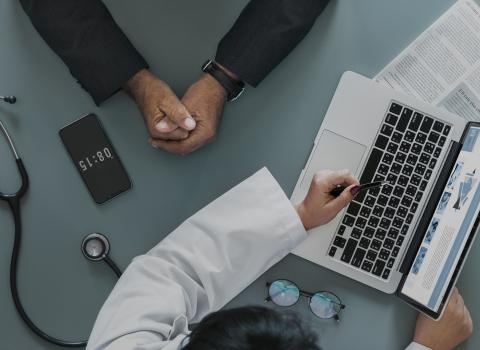This week I watched an interesting programme about the growth in Healthcare services being delivered using Apps and how Artificial Intelligence (AI) can help with the diagnosis of certain diseases. The programme is available for the rest of November 2018 in the UK on the BBC iPlayer service.
Healthcare on demand
In the UK and many other developed Countries we are becoming increasingly used to using our digital devices to access real world services, whether that be ordering products, booking holidays or making social arrangements. In the UK the National Health Service (NHS) does a fantastic job in providing healthcare to everyone, which is free at the point of delivery. They do however have a bad reputation for being slow to adopt the latest technologies. For example the NHS is the World’s largest purchaser of fax machines and one NHS Trust still has 345 of them in use. Along with most technology businesses, our Company stopped using a fax machine several years ago, so the NHS is starting from a long way behind, however I see no reason why they can’t catch up rapidly.
Babylon Health is currently the biggest provider of App accessible healthcare services in the UK and elsewhere. Their GP at hand service allows NHS patients to register with their service, however it is only currently available in London and to people within 40 minutes travelling time of one of their physical locations. Patients have to first transfer their registered Doctor to the Babylon NHS GP at hand service. Once registered, access to healthcare services is initiated using their mobile app. Appointments with Doctors are carried our remotely using video conferencing technology and are generally available with very short waiting times, unlike the days or sometimes weeks it can take to get a traditional Doctor’s appointment.
Whenever technology starts to disrupt any sector there is always an element of resistance and some people quite rightly have real concerns. The Babylon GP at hand service has already signed up over 30,000 Londoners to their service. Due to the way that the NHS funds Doctor’s surgeries there is a real concern that as patients leave traditional practices, they will receive less income, leaving them in a situation where they are unable to continue to provide services to the remaining patients, some of whom have very complex healthcare needs. This situation isn’t the fault of technology, but rather the way that the NHS funds Doctor’s practices.
The convenience and cost savings which can be provided by Healthcare Apps make them very attractive for both users and the healthcare providers. It is essential that the NHS completes their current review as soon as possible and if necessary, looks at how they provide NHS funding to Doctors. The appetite from users for easily accessible health care services isn’t going to diminish and all patients across the UK should be able to benefit.
Using Artificial Intelligence to diagnose disease
Artificial Intelligence (AI) is a term which causes real concern with many people with the apocalyptic concept of machines taking control away from humans. Right now Artificial Intelligence can help to diagnose diseases which could easily be missed using manual diagnostic processes which only involve humans. The main problem in my opinion with Artificial Intelligence is that the results are only as good as the data which the systems are fed to ‘learn’. Therefore, it is very important in the healthcare sector that the introduction of AI systems is subject to the same rigorous testing procedures which would be used for any other non AI process.
A very good example of where AI can provide a better diagnosis than purely humans is breast cancer screening. Kheiron Medical Technologies provide software which assists radiologists detect malignancies in mammograms. This is an excellent example of how Artificial Intelligence can assist human detect disease and provide an overall better diagnosis for patients.
The use of technology in the provision of Healthcare services is a very exciting area, but it does need to be adequately regulated. The ‘move fast and break things’ culture which exists within some technology companies today is completely at odds with the carefully managed processes which are used within the traditional healthcare sector. If you are a technology company working in the healthcare sector then you really don’t want to break anything, as that could literally mean the life or death of a patient.


